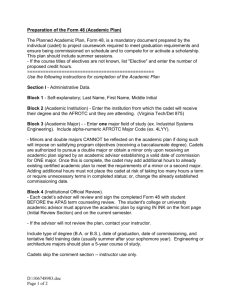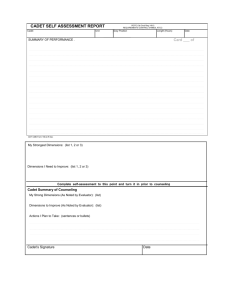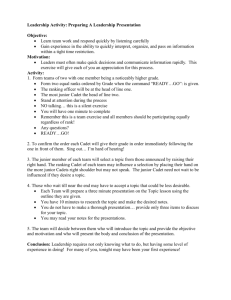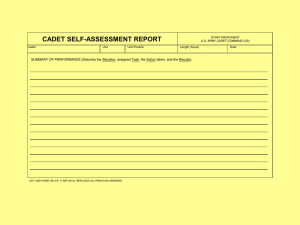Teacher Cadet Course Syllabus Instructor: Mr. Anderson Contact
advertisement
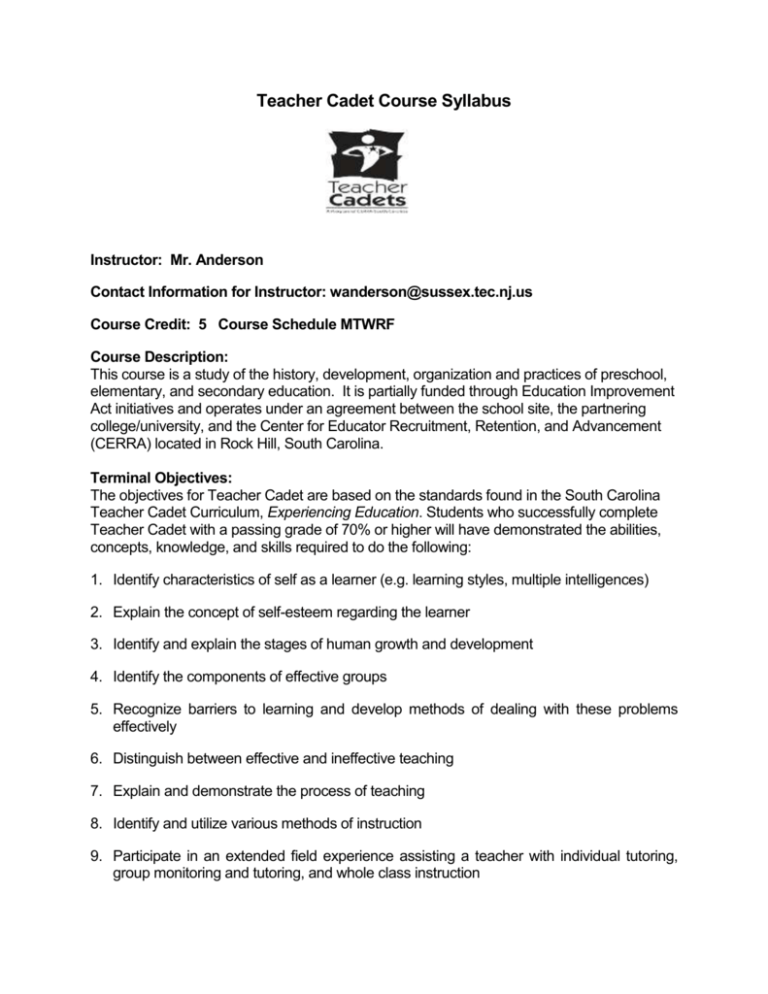
Teacher Cadet Course Syllabus Instructor: Mr. Anderson Contact Information for Instructor: wanderson@sussex.tec.nj.us Course Credit: 5 Course Schedule MTWRF Course Description: This course is a study of the history, development, organization and practices of preschool, elementary, and secondary education. It is partially funded through Education Improvement Act initiatives and operates under an agreement between the school site, the partnering college/university, and the Center for Educator Recruitment, Retention, and Advancement (CERRA) located in Rock Hill, South Carolina. Terminal Objectives: The objectives for Teacher Cadet are based on the standards found in the South Carolina Teacher Cadet Curriculum, Experiencing Education. Students who successfully complete Teacher Cadet with a passing grade of 70% or higher will have demonstrated the abilities, concepts, knowledge, and skills required to do the following: 1. Identify characteristics of self as a learner (e.g. learning styles, multiple intelligences) 2. Explain the concept of self-esteem regarding the learner 3. Identify and explain the stages of human growth and development 4. Identify the components of effective groups 5. Recognize barriers to learning and develop methods of dealing with these problems effectively 6. Distinguish between effective and ineffective teaching 7. Explain and demonstrate the process of teaching 8. Identify and utilize various methods of instruction 9. Participate in an extended field experience assisting a teacher with individual tutoring, group monitoring and tutoring, and whole class instruction 10. Research the history and development of education in the public schools 11. Distinguish between various alternatives to public education—private schools, home schooling, etc. 12. Explain the structure/organization of a school and a school district 13. Research on the Internet and debate in class various educational issues 14. Explain how individuals and schools react to and handle the need for change 15. Develop one’s own vision of the transformation of education Course Materials: Experiencing Education, Tenth Edition SAY, MAY, FLAY curricula Course Outline: The course will be taught in the sequence of units within the curriculum. When necessary, the teacher will make adjustments to the course calendar. Grading, Student Records, and Homework: Student progress is assessed during each grading period of the course. Methods of demonstration, modeling, teamwork in pairs and small groups, hands-on activities, projectsresearch, computer, camcorder or multi-media, speakers, presentations, tests, readings, essays, participation, and self-evaluations will be used for assessment. The field experience will be assessed through journal writing, lesson plans, and a portfolio. A= 93-100% B=85-92% C=77-84% D=70-76% F=69 and below Student Records: A record of each student’s grade performance on all work is maintained. Student work is kept in a binder and/or portfolio. Homework Policy: Students are expected to finish required daily written work and reading assignments for homework if the work is not completed in class. Make-up Policy: Students are expected to make up previously announced tests or turn in previously assigned projects the day they return to class. For all other work, they have 2 days to make up the work that they missed. Class Procedures and Class/School Rules: Students are advised to follow the rules and procedures, as well as the expectations, for the class. The Teacher Cadet instructor will explain those procedures as part of lesson assignments. Communication: Parents can contact the teacher directly at wanderson@sussex.tec.nj.us. Non-Instructional Routines: Each Teacher Cadet will have parents or guardians sign a permission form for observations and field trips for the course. Materials Needed Daily: Students are responsible for bringing to class a three-ring binder, writing utensils, and the handouts/materials announced for the day. Attendance/Tardy Policy: The policies are set forth by the school and the partnering college/university. School Rules about Misbehavior: The school and district clearly outline school rules and policies governing student behavior. Please see the uniformed discipline policy for the Teacher Cadet Program. Teacher Cadet Discipline Policy Student Behavior: Teacher Cadets are given many responsibilities. They must be mature, dependable, responsible, but most of all trustworthy. BEING A MEMBER OF THIS PROGRAM IS A PRIVILEGE. In order to promote positive choices, prevent discipline measures, and to enhance the credibility of the Teacher Cadet Program, Teacher Cadets must comply with duties and responsibilities set forth by the Teacher Cadet instructor, the guidance department, and the administration, in addition to school/district rules outlined in the Student Handbook. A Teacher Cadet MUST adhere to the following in accordance with the Teacher Cadet Code of Conduct: 1. TCs must arrive to school and to each class on time. 2. TCs must show respect for him/herself, peers, teachers, and all other members of the school community. 3. TCs will not fight or use force or intimidation with any member of the school community. 4. TCs will not use profane or vulgar language or gestures. Racial, ethnic, religious, gender, or sexual orientation slurs will not be used by any member of the program. 5. TCs will not use, sell, or be in possession of alcohol/tobacco products/drugs on school grounds, elementary and middle school sites (during observations and field experiences), college sites or any other offsite location as a representative of the Teacher Cadet Program. 6. TCs will dress in a professional manner on and off campus when being a representative of the school or Teacher Cadet Program. 7. TCs will adhere to all school and district rules. Teacher Cadets who disregard the above stated rules are in violation of the code of ethics set forth by the Teacher Cadet Program and the Teacher Cadet instructor. Discipline referrals will be reviewed by the instructor on an individual basis and the removal of any student from the program will be based on the Teacher Cadet instructor’s recommendation, teacher referrals, and guidance/administrative approval. Parents will be informed if their child has been removed from the program. Again, THIS PROGRAM IS A PRIVILEGE. The consequences for Teacher Cadets who disregard the above noted Code of Conduct will be as follows: · The TC will be held accountable for his/her actions. · The TC will receive a verbal warning from the instructor. · The TC’s parent/guardian will be notified when unacceptable behavior persists. · The TC will be referred to the appropriate school administrator for disciplinary action. · The TC will be removed from the class. · If a TC has paid for college credit at the partnering college/university, all rights to credit from the Teacher Cadet course will be forfeited and no refund of any payment will be given. This is a college/university policy. Neither the Teacher Cadet instructor nor the school will be held liable for fees already processed by the partnering college/university. Note: Consequences will be based upon the severity and frequency of the offense. Thus, there are circumstances that could warrant immediate removal from the course.
